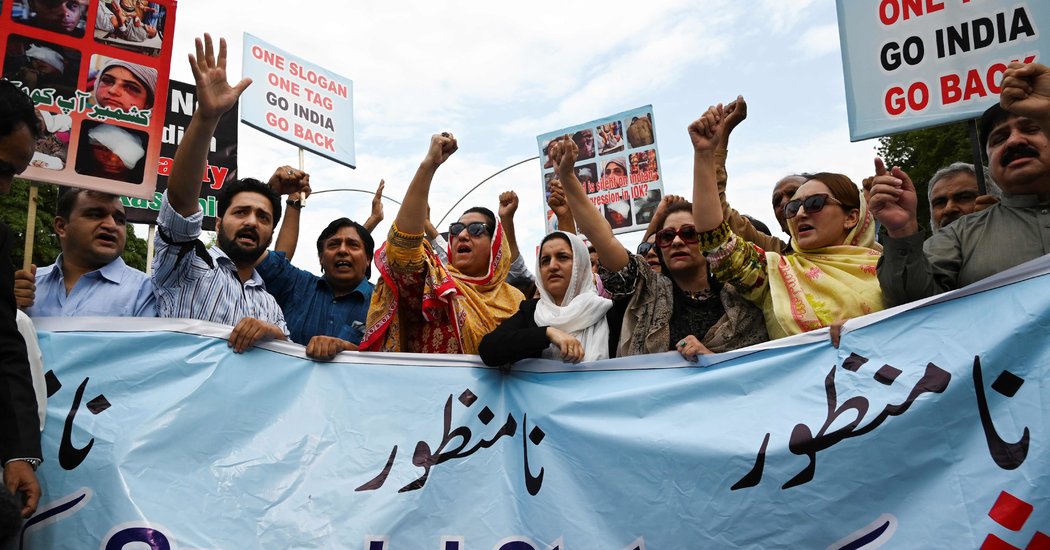NEW DELHI — The dispute over Kashmir has long been a flash point for war between India and Pakistan, with each nuclear-armed country holding the threat of retaliation over the other. But when India stripped the Indian-controlled region of Kashmir of its autonomy this week, Pakistan’s reaction appeared to be limited to high-level hand-wringing.
As Pakistan marks its independence day next week, it increasingly feels like a nation with its back against the wall, with few options to protect its existential interests. Its economy is teetering on the brink of collapse, and its international allies have either stayed silent over Kashmir or defected in support of India.
A conventional military reaction is probably too costly as Pakistan seeks to tighten its belt to shore up its finances. And one of the most effective strategies Pakistan has traditionally employed — using an array of militant groups as proxies to keep neighbors in check — has become a liability, amid the threat of international sanctions. (Pakistan has denied that it uses militant groups to achieve its foreign policy objectives.)
“The economy is hindering Pakistan’s options. As they head to a recession can they really afford a war right now?” said Arif Rafiq, the president of Vizier Consulting, a consulting firm on South Asian political and security issues. “Their capacity to bear the cost of a full-fledged conflict with India over Kashmir, whether via insurgent networks or conventionally — there just are not a lot of options Pakistan has.”
Last year, Pakistan, in an effort to end its global isolation, agreed to help the United States end its war in Afghanistan by delivering the Taliban leadership to the table for peace talks. In doing so, Pakistan employed one of its greatest sources of leverage with the United States. Those talks are now nearing a conclusion, with American negotiators sitting across the table from their Taliban counterparts and aiming to reach a settlement soon.
In recent days, several Pakistani government officials have demanded that their country end its cooperation in the peace talks to protest American silence over India’s elimination of Kashmir’s autonomy. But the Taliban on Thursday issued a forceful statement warning against any meddling.
“Linking the issue of Kashmir with that of Afghanistan by some parties will not aid in improving the crisis at hand because the issue of Afghanistan is not related, nor should Afghanistan be turned into the theater of competition between other countries,” the Taliban statement read.
The outcome of the peace talks and Pakistan’s role in them will likely influence whether the country finds itself blacklisted internationally over its continued support of terrorist organizations, a move that could make or break its faltering economy. The Paris-based group that monitors terrorism financing, the Financial Action Task Force, will vote in October on whether Pakistan has done enough to crack down on militant networks at home.
Pakistan hopes to make the case that it has moved against militant groups and should be taken off the gray list on which the watchdog placed it last year. Pakistan deeply fears it could be blacklisted, denied access to international financial markets at a time when it desperately needs loans to stay afloat. If Pakistan is blacklisted, it could tip the economy into recession.
Prime Minister Imran Khan of Pakistan seemed worried about the lack of options to force India to walk back its new Kashmir policy.
Meeting with Pakistani journalists on Thursday, Mr. Khan dismissed using “jihadi organizations” against India in Kashmir. “There are more disadvantages than advantages,” Mr. Khan said, according to Amber Rahim Shamsi, a reporter for Samaa TV who attended the meeting.
The possibility of international sanctions also seemed to weigh on Mr. Khan.
“Pakistan has taken every step to get itself out of the baggage of the past,’’ the prime minister told the group of journalists, according to a second account of the meeting.
He said the government had undertaken “a complete cleansing operation” against terrorist groups. “My government has ensured there is a complete and sincere effort to bring Pakistan out of FATF,” Mr. Khan added, referring to the Financial Action Task Force.
Pakistan’s foreign minister has said he would raise the issue of Kashmir to the United Nations Security Council for a vote. But so far, the country’s closest allies have remained silent on the matter.
Muslim nations have usually supported Pakistan’s claims on Kashmir. But with their own economic and political troubles at home, many have tilted toward India, looking to secure lucrative deals with the ascending economic power.
The biggest blow came from the influential United Arab Emirates, which stated that Kashmir was an internal matter for India, withdrawing any support to raise the issue internationally.
India has long maintained that Kashmir is an internal issue; the disputed territory chose to join India rather than Pakistan during partition in 1947, based on assurances that its autonomy would be maintained. Pakistani forces invaded part of Kashmir and now control that part of the territory.
When Pakistan agreed after the September 11, 2001 attacks to help the United States fight terrorist groups, they asked for a favor in return — American help mediating on Kashmir and pressing India to make concessions. When the United States refused, Pakistan felt betrayed.
Just last month Pakistanis felt more upbeat about their country’s prospects. Mr. Khan had returned from a visit to the White House where he met with Mr. Trump, who promised to intervene on Kashmir. But India’s swift action days later to strip Kashmir of its autonomy plunged Pakistan back into isolation.
“The U.S. has again let us down, and those who were starry-eyed about the American trip have got a wake-up call,” Senator Mushahid Hussain said in a speech this week.

















